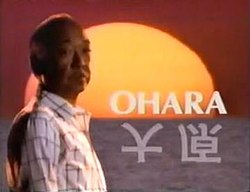| Ohara | |
|---|---|
 Pat Morita as Ohara | |
| Genre | Police procedural |
| Created by |
|
| Developed by | Ronald M. Cohen |
| Starring | |
| Composer | Bill Conti |
| Country of origin | United States |
| Original language | English |
| No. of seasons | 2 |
| No. of episodes | 30 |
| Production | |
| Executive producers |
|
| Producers |
|
| Running time | 60 minutes |
| Production companies |
|
| Original release | |
| Network | ABC |
| Release | January 17, 1987 – May 7, 1988 |
Ohara is an American police procedural television series that first aired on the ABC television network from January 17, 1987, until August 6, 1988, starring Pat Morita in the title role of Lt. Ohara. [1] Morita also co-created the series along with Michael Braveman and John A. Kuri.[ citation needed ] Kevin Conroy, Jon Polito, Rachel Ticotin, and Robert Clohessy also starred in supporting roles. The series was notable for being one of the first television series to have a Japanese-American actor in the leading role.